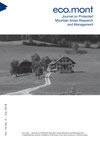推特上的国家公园:德语视角
IF 0.8
4区 环境科学与生态学
Q4 BIODIVERSITY CONSERVATION
Eco Mont-Journal on Protected Mountain Areas Research
Pub Date : 2022-01-01
DOI:10.1553/eco.mont-15-1s25
引用次数: 2
摘要
从社交媒体平台上挖掘数据,以探索人类行为的各个方面,包括对自然环境的态度或参观保护区,已经变得越来越流行。大多数研究和分析算法涉及以英语发表的数字内容。不过,以其他语文进行研究以补充现有的国际研究也是有用的。我们的主要目的是探索2006年至2021年7月期间发布的关于国家公园的推特内容。该研究还对2019年和2020年在国家公园发布的与Covid-19大流行相关的推文进行了差异化分析。这些推文来自德语国家,也来自世界其他国家。最常被提及的国家公园主要位于山区,但与其他主题相比,与山直接相关的术语、标签、表情符号和话题却很少。推特上最常见的词汇包括森林(Wald)、假日(Urlaub)和自然(nature)等,这些信息不仅与自然遗产和环境保护有关,还与自然灾害有关。新冠肺炎大流行和国家公园也是推特上讨论的主题,通常附有照片或视频。由于所研究的所有推文中有85%从未被转发,92%从未收到回复,74%从未被分配点赞,我们得出结论,对山区保护区感兴趣的用户有可能改善(社交媒体)沟通。©2023,Eco.mont。版权所有。本文章由计算机程序翻译,如有差异,请以英文原文为准。
National Parks in Twitter: A German-speaking perspective
Mining data from social media platforms has become increasingly popular to explore aspects of human behaviour, including attitudes towards the natural environment or visiting protected areas. Most studies and analytical algorithms refer to digital content published in English. However, it is also useful to conduct research in other languages to complement existing international studies. Our main aim was to explore Twitter content on national parks, published between 2006 and July 2021, in German. The study also presents a differentiated analysis for tweets published in 2019 and 2020 on national parks and associated with the Covid-19 pandemic. The tweets came from German-speaking countries, but also other countries worldwide. The most frequently mentioned national parks were located mainly in mountain areas, yet terms, hashtags, emojis and topics directly relating to mountains were rare in comparison to other subjects. Tweets most frequently included words such as forest (Wald), holiday (Urlaub) and nature (Natur);messages related not only to the natural heritage and environmental protection but also to natural disasters. The Covid-19 pandemic and national parks were also a subject of discussion on Twitter, often accompanied by photographs or videos. As 85% of all the tweets studied were never retweeted, 92% never received a reply, and 74% were never assigned likes, we conclude that there is potential to improve (social media) communications by users interested in protected areas in mountainous regions. © 2023, Eco.mont. All Rights Reserved.
求助全文
通过发布文献求助,成功后即可免费获取论文全文。
去求助
来源期刊

Eco Mont-Journal on Protected Mountain Areas Research
BIODIVERSITY CONSERVATION-ECOLOGY
CiteScore
1.20
自引率
0.00%
发文量
1
审稿时长
>12 weeks
期刊介绍:
eco.mont offers a platform specifically for scientists and practitioners working in and on protected mountain areas in Europe and overseas.Target audiences of the journal are scientists from all related disciplines, managers of protected areas and an interested public including practitioners, visitors, teachers, etc.
 求助内容:
求助内容: 应助结果提醒方式:
应助结果提醒方式:


